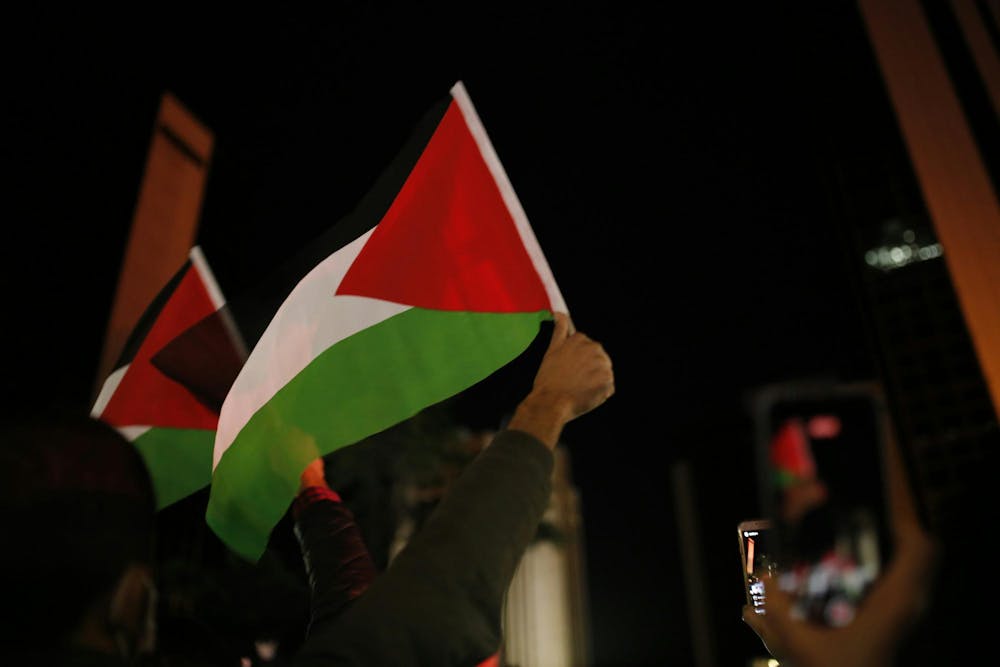On Oct. 7, HAMAS — the Arabic acronym for the Islamic Resistance Movement — killed 1,400 and took several Israeli’s hostage. While this is not the first conflict that has occurred between Israel and Palestine, this attack has gained global attention and initiated an ongoing full forced military attack on Gaza which is often referred to as an open-air prison due to the strict border restrictions that make it nearly impossible for Palestinians to leave Gaza. Palestinians have been under Israeli occupation since 1967 where their materials, resources and rights are controlled and mandated by the state of Israel. There is so much history to unpack to fully understand the events that took place on Oct. 7 and why Palestine and Israel exist the way they do today. In this article, I am going to be focusing on the current ongoing reproductive rights crisis being faced by thousands of women and children. This is not to disregard the very important history that provides essential context for the conflict that is often ignored by Western mainstream media. Here is a great resource that provides a succinct outline of the history of Palestine and the Israeli occupation. It is worth every bit of your attention.
As of Feb. 10, 28,064 Palestinians have been killed, and 67,611 have been injured since October 7. More than 17,000 of these deaths in Gaza have been women and children. Women in Gaza are being confronted with extremely limited resources for pregnancy, miscarriages, prenatal and postnatal care, nutrients and general menstrual products. However, this reproductive crisis is not only a symptom of the ongoing Israeli military attack on Gaza. Prior to Oct. 7, according to the UNFPA, 94,00 women lacked sexual and reproductive care. Access to sexual and reproductive health materials was extremely limited before the airstrikes, and consequently pregnant and menstruating women are left with no reproductive health resources, further stripping them of their bodily autonomy and reproductive rights.
According to the International Planned Parenthood Federation, an estimated 50,000 pregnant women in Gaza urgently need prenatal and postnatal care while 180 women are giving birth daily. Around 15% are likely to encounter complications during pregnancy or childbirth and will be unable to access life saving services that could ensure the safety, health and well-being of mother’s newborns. As stated in the United Nations rapid gender analysis of the situation in Gaza, hospitals and health centers that provide sexual and reproductive health and rights services have suffered severe damage due to airstrikes. Additionally, this report indicates that the crisis will result in a dramatic increase in maternal and infant mortality and morbidity which not only threatens the bodily autonomy of Palestinian women, but also undermines the progress of health services that were previously being made in Palestine.
In addition to a lack of sexual and reproductive health services, the deteriorating access to food and water in Gaza is causing mothers to suffer and be unable to provide enough breastmilk for their newborns. A lack of adequate nutrition and dehydration have severely increased the risk of maternal deaths. This has placed Palestinian women and girls in the impossible position of deciding whose life needs saving more — their own, their unborn children or their newborns. Palestinian women and children are being forced to make impossible decisions, but they do not have a choice. Women and children are the primary victims of Israeli airstrikes and military attacks who are being given the impossible task of surviving in a war zone.
Another layer to the multidimensional reproductive crisis in Gaza is menstruation. Over 690,000 menstruating women and girls in Gaza do not have access to basic sanitary products such as pads, tampons or any other alternative. Many women are using period-delaying pills, but this resource is both limited and has dangerous side affects. With a lack of water, hygiene products and privacy, women and girls are unable to have their basic needs met as they are just trying to survive.
Reproductive rights in Gaza is a feminist issue. Women’s rights in Gaza is a feminist issue. Palestinian rights are a feminist issue. Western media will never accurately convey the ongoing crisis occurring in Palestine, so it is important now more than ever to use your voice to raise awareness about this ongoing conflict and seek out resources to educate yourself on this historical issue. While large statistics have a profound impact in raising awareness, it is important that everyone remembers that each number represented by the Palestinian death count by Israeli attacks is a human being who has been under Israeli occupation for 75 years. You cannot justify genocide, human rights abuses and the denial of basic resources that humans need to survive. Palestinian women and children should not be paying the price of settler colonialism with their lives. This prevalent, ongoing social justice issue needs more attention than it is getting. You can not stop violence with violence, two wrongs do not make a right and above all there is absolutely no justification for murdering non-combatants and civilians. Feminists must continue to raise awareness about this issue as reproductive justice for Palestinian women means reproductive justice for all women. As Nelson Mandela once said, “Our freedom is incomplete without the freedom of the Palestinians.” Speak out, raise awareness and organize to fight for a ceasefire and secure justice for Palestinians.
Organizations to support:
Reproductive hygiene kits: https://piousprojects.org/campaign/2712
Ceasfire now: https://ceasefiretoday.com/
Student Voices for Palestine: @svpnotredame
Grace Sullivan is a sophomore at Notre Dame studying global affairs with minors in gender and peace studies. In her column I.M.P.A.C.T. (Intersectionality Makes Political Activist Change Transpire), she is passionate about looking at global social justice issues through an intersectional feminist lens. Outside of The Observer, she enjoys hiking, painting and being a plant mom. She can be reached at gsulli22@nd.edu.










